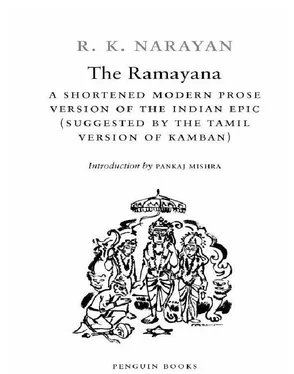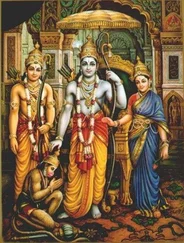Махариши Вальмики - The Ramayana
Здесь есть возможность читать онлайн «Махариши Вальмики - The Ramayana» весь текст электронной книги совершенно бесплатно (целиком полную версию без сокращений). В некоторых случаях можно слушать аудио, скачать через торрент в формате fb2 и присутствует краткое содержание. Жанр: Старинная литература, на английском языке. Описание произведения, (предисловие) а так же отзывы посетителей доступны на портале библиотеки ЛибКат.
- Название:The Ramayana
- Автор:
- Жанр:
- Год:неизвестен
- ISBN:нет данных
- Рейтинг книги:3 / 5. Голосов: 1
-
Избранное:Добавить в избранное
- Отзывы:
-
Ваша оценка:
- 60
- 1
- 2
- 3
- 4
- 5
The Ramayana: краткое содержание, описание и аннотация
Предлагаем к чтению аннотацию, описание, краткое содержание или предисловие (зависит от того, что написал сам автор книги «The Ramayana»). Если вы не нашли необходимую информацию о книге — напишите в комментариях, мы постараемся отыскать её.
The Ramayana — читать онлайн бесплатно полную книгу (весь текст) целиком
Ниже представлен текст книги, разбитый по страницам. Система сохранения места последней прочитанной страницы, позволяет с удобством читать онлайн бесплатно книгу «The Ramayana», без необходимости каждый раз заново искать на чём Вы остановились. Поставьте закладку, и сможете в любой момент перейти на страницу, на которой закончили чтение.
Интервал:
Закладка:
In the loneliness of his chamber, Dasaratha told himself, “One must know when to cease, and not wait for death or dotage. While my faculties are intact, let me seek retirement and rest. There is no sense in continuing and repeating the same set of activities performed all these several thousand years, as it seems to me now. Enough, I have done enough. I must now find the time to stand back and watch and lay aside the burdens of office.”
He arrived at a drastic decision. He summoned his aide to the door, and told him to summon Sumanthra, his chief minister, immediately. “Send round an announcement for all our officers and public men, sages and wisemen, and all our allies and kings and relations to gather at our hall of assembly. Let as many as possible arrive.”
He added, while Sumanthra waited, “No need to inform, among our relatives, Aswapathi.” He was the father of his third wife, Kaikeyi. Bharatha, her son, had gone there to spend a few days with his grandfather. “No need to trouble Janaka either. Mithila is too far away, and he will not be able to come in time.”
“Is there anyone else to be omitted?”
“No. Invite as many as you can conveniently, and all our citizens.” Messengers were dispatched in all directions. The assembly hall filled up. Dasaratha ascended the steps to his seat and, after the routine ceremonials, gestured to all to resume their seats, and spoke:
“I have performed my duties as King of this country long enough. Now I have an irresistible feeling that the burden must be shifted over to younger shoulders. What do you gentlemen think about it? Under the white umbrella of the royal state, apparently there has been no change—but actually the body under it is withering. I have lived and functioned long enough. If I still thought that I should continue thus endlessly, it would amount to avarice. The other day I realized that my signature on a document was hazy. My hand must have trembled without my knowing it. The time has come for me to sit back and rest—and anticipate the coming of grandchildren. If you will agree, I want to hand over the kingdom to Rama. He should be my successor, an embodiment of all perfection. He is perfect and will be a perfect ruler. He has compassion, a sense of justice, and courage, and he makes no distinctions between human beings—old or young, prince or peasant; he has the same consideration for everyone. In courage, valour, and all the qualities—none to equal him. He will be your best protector from any hostile force, be it human or subhuman or superhuman. His asthras, acquired from his master Viswamithra, have never been known to miss their mark. . . . I hope I shall have your support in anointing him immediately as the Emperor of Kosala.”
A joyous shout rang through the assembly. Dasaratha waited for it to subside and asked, “I note the zest with which you welcome my successor. Should I take it that you do so because you have been bearing with me silently for any reason all these years, although I had thought I had dedicated my life fully to the welfare of my subjects?”
A spokesman rose and explained. “Do not mistake us, Your Majesty. It is our love for Rama that makes us so happy now. We have long looked forward to this moment. To see him ride the Royal Elephant in full paraphernalia through the streets of our capital is a vision of the future that we cherish, young and old alike, for we are lost in the splendour of Rama’s personality. It is that anticipation that makes us applaud your proposal so unreservedly. It is not that we do not wish for the continuance of Your Majesty.”
Dasaratha said, “I agree with you. I just wanted to know without a trace of doubt that you approve of my desire to make Rama your King. I desire that tomorrow when the Pushya star is in combination with the moon, and the time is auspicious, Rama be crowned.”
He summoned his minister and the priest. “Let everything, every little detail be ready for the ceremony of coronation tomorrow. Let there be widespread decorations and have all items ready at the coronation hall. Let the streets be washed, cleaned, and decorated. Let people feast and play and enjoy themselves unlimitedly. Let there be arrangements to serve a feast continuously in every corner of this capital. . . .”
He sent for Rama. He watched his arrival from his balcony, received him warmly, took him aside, and said, “Tomorrow, you will be crowned as my successor. I need rest from work.”
Rama accepted the proposal with a natural ease. Dasaratha continued. “You know everything, but still I feel it a duty to say a few words. You will have to pursue a policy of absolute justice under all circumstances. Humility and soft speech—there could be really no limit to these virtues. There can be no place in a king’s heart for lust, anger, or meanness.” He went on thus for some time and terminated the meeting. When Rama was back in his palace, explaining the situation to Sita, Sumanthra was once again knocking on his door.
“Your father summons you.”
“Again? I have just come from him.”
“He knows it, but wants you again.”
When Rama presented himself, Dasaratha seated him and said, “You may be surprised at being called again. I am seized with anxiety that you should be crowned without any delay. I have premonitions which are frightening. I dream of comets, hear foul screeches from nowhere. I am told that my stars are not in a happy conjunction now. I dreamt that my star of nativity had crashed and was on fire. For one’s proper birth, one owes a debt to the benediction of immortal sages, to one’s ancestors, and to the gods; these three debts have to be discharged fully within the allotted span of one’s life. I have no doubt that I have paid my debts fully by now. I have enjoyed my life, I have ruled as King with unquestioned authority and earned the love and confidence of my subjects. There is nothing left for me to do. I have grown old, my physical body is ready for dissolution. . . .”
He had said these things before and was now repeating himself. Rama understood that there must be some deep agitation within him. But out of respect and graciousness, he listened to it all again as if for the first time. “My stars, Mars and Jupiter, are aspecting the same house, so say my astrologers, which means death or near death or some catastrophe. And so I want to impress on you the urgency of the matter. Tomorrow’s star will be Pushya, and the ceremony must be gone through, without doubts or impediments. Do not think for a moment that anything is postponable. Nothing should be put off, for we cannot say how fickle the human mind is, and what changes will occur therein. . . . And so what is important is that we should go through the ceremonies without hesitation. I want you to be very careful tonight, until the ceremony is over. Do not come out without your bodyguard, and observe all the austerities and vows to the last letter. Sita and yourself should have ritual baths and avoid your bed and sleep lightly on a mat of dharbha grass. . . . The ceremonies will begin at dawn. Be ready, and see that your robes are ready. You must fast tonight. Caution Sita not to delay. In a ceremonial, the wife’s presence and timely participation are of the utmost importance. . . .”
Rama listened, promising to carry out every word of his instructions faithfully. Finally Dasaratha explained, “It is best to complete all this while Bharatha is away at his grandfather’s place. It is good that he is away. I know his devotion to you, but the human mind, you know, can be fickle. . . . He may question why he should not have been the king . . . after all. But if he learns of it as an accomplished fact, I do not doubt that he will be extremely happy.”
His father’s deviousness was rather startling, but if he noticed it, Rama did not show it.
Читать дальшеИнтервал:
Закладка:
Похожие книги на «The Ramayana»
Представляем Вашему вниманию похожие книги на «The Ramayana» списком для выбора. Мы отобрали схожую по названию и смыслу литературу в надежде предоставить читателям больше вариантов отыскать новые, интересные, ещё непрочитанные произведения.
Обсуждение, отзывы о книге «The Ramayana» и просто собственные мнения читателей. Оставьте ваши комментарии, напишите, что Вы думаете о произведении, его смысле или главных героях. Укажите что конкретно понравилось, а что нет, и почему Вы так считаете.












